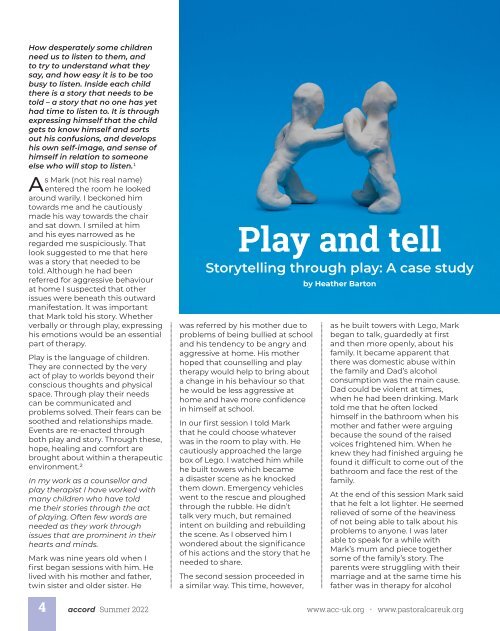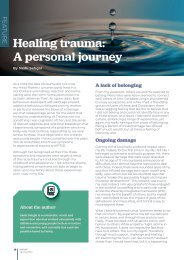ACC E-Accord Summer 2022
Create successful ePaper yourself
Turn your PDF publications into a flip-book with our unique Google optimized e-Paper software.
How desperately some children<br />
need us to listen to them, and<br />
to try to understand what they<br />
say, and how easy it is to be too<br />
busy to listen. Inside each child<br />
there is a story that needs to be<br />
told – a story that no one has yet<br />
had time to listen to. It is through<br />
expressing himself that the child<br />
gets to know himself and sorts<br />
out his confusions, and develops<br />
his own self-image, and sense of<br />
himself in relation to someone<br />
else who will stop to listen.¹<br />
As Mark (not his real name)<br />
entered the room he looked<br />
around warily. I beckoned him<br />
towards me and he cautiously<br />
made his way towards the chair<br />
and sat down. I smiled at him<br />
and his eyes narrowed as he<br />
regarded me suspiciously. That<br />
look suggested to me that here<br />
was a story that needed to be<br />
told. Although he had been<br />
referred for aggressive behaviour<br />
at home I suspected that other<br />
issues were beneath this outward<br />
manifestation. It was important<br />
that Mark told his story. Whether<br />
verbally or through play, expressing<br />
his emotions would be an essential<br />
part of therapy.<br />
Play is the language of children.<br />
They are connected by the very<br />
act of play to worlds beyond their<br />
conscious thoughts and physical<br />
space. Through play their needs<br />
can be communicated and<br />
problems solved. Their fears can be<br />
soothed and relationships made.<br />
Events are re-enacted through<br />
both play and story. Through these,<br />
hope, healing and comfort are<br />
brought about within a therapeutic<br />
environment.²<br />
In my work as a counsellor and<br />
play therapist I have worked with<br />
many children who have told<br />
me their stories through the act<br />
of playing. Often few words are<br />
needed as they work through<br />
issues that are prominent in their<br />
hearts and minds.<br />
Mark was nine years old when I<br />
first began sessions with him. He<br />
lived with his mother and father,<br />
twin sister and older sister. He<br />
Play and tell<br />
Storytelling through play: A case study<br />
was referred by his mother due to<br />
problems of being bullied at school<br />
and his tendency to be angry and<br />
aggressive at home. His mother<br />
hoped that counselling and play<br />
therapy would help to bring about<br />
a change in his behaviour so that<br />
he would be less aggressive at<br />
home and have more confidence<br />
in himself at school.<br />
In our first session I told Mark<br />
that he could choose whatever<br />
was in the room to play with. He<br />
cautiously approached the large<br />
box of Lego. I watched him while<br />
he built towers which became<br />
a disaster scene as he knocked<br />
them down. Emergency vehicles<br />
went to the rescue and ploughed<br />
through the rubble. He didn’t<br />
talk very much, but remained<br />
intent on building and rebuilding<br />
the scene. As I observed him I<br />
wondered about the significance<br />
of his actions and the story that he<br />
needed to share.<br />
The second session proceeded in<br />
a similar way. This time, however,<br />
by Heather Barton<br />
as he built towers with Lego, Mark<br />
began to talk, guardedly at first<br />
and then more openly, about his<br />
family. It became apparent that<br />
there was domestic abuse within<br />
the family and Dad’s alcohol<br />
consumption was the main cause.<br />
Dad could be violent at times,<br />
when he had been drinking. Mark<br />
told me that he often locked<br />
himself in the bathroom when his<br />
mother and father were arguing<br />
because the sound of the raised<br />
voices frightened him. When he<br />
knew they had finished arguing he<br />
found it difficult to come out of the<br />
bathroom and face the rest of the<br />
family.<br />
At the end of this session Mark said<br />
that he felt a lot lighter. He seemed<br />
relieved of some of the heaviness<br />
of not being able to talk about his<br />
problems to anyone. I was later<br />
able to speak for a while with<br />
Mark’s mum and piece together<br />
some of the family’s story. The<br />
parents were struggling with their<br />
marriage and at the same time his<br />
father was in therapy for alcohol<br />
4 accord <strong>Summer</strong> <strong>2022</strong> www.acc-uk.org • www.pastoralcareuk.org



